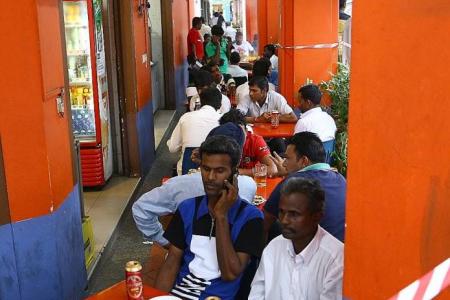Little India, big changes
WORKERS: IT'S NOT AS JOLLY ANY MORE
On a rainy Sunday much like yesterday, Little India was irrevocably changed.
A year after Singapore's first riot in four decades on Dec 8 last year, that little pocket of Singapore which turns into an enclave for South Asian workers during the weekend has become cleaner, brighter, and perhaps, more sober, in more ways than one.
When The New Paper visited yesterday, several workers told us that it is "no longer as jolly", and some even try to stay away.
Mr Aarumugam Ravi, 45, who has been working here for 17 years, said he no longer visits Little India as often as he used to.
"After the riot, it's not as jolly as it used to be. Too many rules and policemen around," he told TNP in Tamil, adding he used to meet friends there every week, have a few drinks and unwind. "Now, it feels very tense," he said.
As we speak to him near Chander Road, Special Operations Command (SOC) vehicles can be seen in the background.
By the bus station at the junction of Race Course Road and Tekka Lane, half a dozen police officers - including those from the SOC - keep watch.
Mr Aarumugam was on his monthly visit to Little India with his cousin, Mr Muthu Illaiyappan, 44. The pair were there to remit money and buy groceries.
First Sundays of the month are traditionally busy times for the remitters because it is when workers want to send money home.
But with more remitters setting up shop in worker dormitories, the crowd at Little India has also thinned.
Also contributing to the thinning crowd: the alcohol ban.
Measures put in place mean that drinking in public is forbidden - coffee shops, restaurants and bars have to ensure the drinks are consumed within their premises.
Liquor stores, which used to do a roaring trade on weekends, now have to stop selling at 8pm.
Not that it makes a difference: their customers have nowhere to drink.
Then there are those like Mr U. Mohan, who keeps away to stay out of trouble.
The technician, who has been working here for eight years, told TNP in Tamil: "I don't really want to come here because I'm worried of getting into trouble."
"I'm scared that if I'm here, and something bad happens, something might happen to me too," he said.
As we were leaving, we spotted Mr R. Murugan (below), 38.

The construction worker said the stricter regulations have been a long time coming.
"We shouldn't be drinking in public, it's wrong," he said in Tamil.
Mr Murugan added: "We come from another country, and we are staying here. If we do things (that go against the law), Singaporeans wouldn't accept us."
SHOPKEEPERS: WE'RE SUFFERING
He has only three months to turn things around, Mr Sadhasivam Kailasam said.
Barely nine months after he put $100,000 into opening his liquor store on Chander Road in March 2013, the Dec 8 riots happened.
After the new regulations kicked in, Mr Sadhasivam said his business has gone down by "almost 99 per cent".
"Last time, I could sell at least 10 cartons (of 24 cans) each of (Haywards) 5000, Kingfisher and Knockout beer every weekend. Now, I'm happy if I sell one carton each," he said.
The 42-year-old said customers have nowhere to drink in the area, and usually take the liquor back to their dormitories.
"But in the dormitory, they have shops there selling too, so why should they buy here?"
Since January, he has put in another $20,000 to keep his business afloat, even borrowing from banks.
"Maybe the Government should have something like a beer garden where people can drink, so people like me won't go out of business," he added.
Further down Chander Road at Yeo Ban Heng, owner David Yeo is slightly more optimistic.
The 59-year-old said that while retail business has gone down by more than half, the pay off has been worth it.
"This area has cleaned up a lot. Now we don't get vomit outside our shops every Monday, and there are fewer fights," he said.
Yeo Ban Heng is also an alcohol wholesaler, which helps pay the bills, Mr Yeo said.
Moreover, the shophouse is family-owned, which means there is no rent to worry about.
Asked if he thinks the new measures have been too harsh, he likened it to taking medication: "When you're sick, you need strong medicine to cure your illness."
RESIDENTS: KEEP IT THIS WAY
In a phone interview with The New Paper, former chairman of the Tekka Residents Committee, Mr Martin Pereira, said Little India's residents want the new regulations to continue.
The Public Order (Additional Temporary Measures) Act, which bans alcohol consumption in the area during weekends, public holidays and the eve of public holidays, will expire in March next year.
"We want to see it continue even after it expires," Mr Pereira said, adding that residents even want the drinking ban to start on Friday mornings instead of Saturday.
Previously, the authorities thought a light touch in Little India would have been sufficient, and that was tolerated by the residents, Mr Pereira said, but that was "not reciprocated by the foreign workers".
"While the wound (caused by the riot) has healed, the scars are still there," he said.
Asked if the measures have been too draconian, he demurred.
"To those who say the authorities have gone overboard, I say: 'You don't live here, you don't know the extent of our problems'," he said.
Get The New Paper on your phone with the free TNP app. Download from the Apple App Store or Google Play Store now



